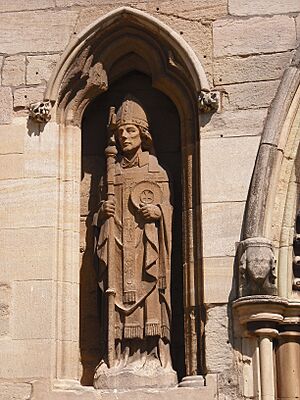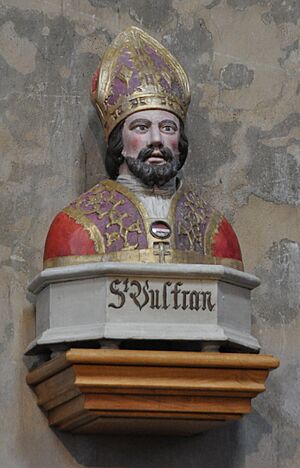Wulfram of Sens facts for kids
Quick facts for kids SaintWulfram of Sens |
|
|---|---|

St. Wulfram statue at his church in Grantham, Lincolnshire.
|
|
| Confessor | |
| Born | c. 640 probably Milly-la-Forêt, Essonne, in now France |
| Died | 20 March 703 Fontenelle, Kingdom of the Franks (now France) |
| Venerated in | Roman Catholic Church, Anglican Communion,< Eastern Orthodox Church |
| Major shrine | Abbeville; Grantham |
| Feast | 20 March 15 October (Translation of his mortal remains) |
| Attributes | Bishop baptizing a young king; cleric with a young king nearby; cleric arriving by ship with monks and baptizing a king; baptizing the son of King Radbod |
| Patronage | Abbeville, France |
Wulfram of Sens (also known as Wulfram of Fontenelle) was an important religious leader who lived a long time ago, from about 640 to 703 AD. He became the Archbishop of Sens, a major church leader in what is now France. People remember him for his work as a missionary, especially for trying to convert people in a place called Friesland.
In art, you might see Saint Wulfram shown baptizing a young king or the son of a king named Radbod. Sometimes, he's shown arriving by ship with other monks to baptize a king. There are churches named after him in England and France. He is also known as a patron saint who helps protect sailors and others from dangers at sea.
Who was Wulfram?
His Early Life

Wulfram was born around 640 AD in a place called Mauraliacus, which is probably near Milly-la-Forêt in modern-day France. His father, Fulbert, was a knight who worked for King Dagobert I of the Franks. After Dagobert died, Wulfram grew up near the court of King Clovis II.
Wulfram was very good at studying and learning. He decided to become a priest, hoping for a quiet life. However, he was called to work for King Theuderic III. This led him to become more famous.
Becoming an Archbishop
Around 692 AD, Wulfram was chosen to be the Archbishop of Sens. An Archbishop is a very high-ranking bishop who oversees many churches and priests in a large area. He attended an important meeting of bishops in 693, showing he was active in his role.
But in 695, Wulfram decided to step down from being Archbishop. He felt that another person, Amatus of Nusco, would be better at the job. Wulfram then chose to live a quieter life at a Benedictine abbey called Fontenelle. This abbey is now known as Abbey of Saint Wandrille, located near the River Seine in France.
His Mission in Friesland
Wulfram is famous for his missionary work in a region called Frisia (now part of the Netherlands and Germany). He went there to teach people about Christianity.
In Friesland, Wulfram was able to convert the son of King Radbod, who was the ruler of the region. This allowed Wulfram to preach and share his beliefs more freely. He even saved three people who were about to be sacrificed to local gods. One of these people, named Ovon, became Wulfram's follower and later a priest.
The people of Friesland were amazed by the missionaries' faith and their ability to perform miracles. Many of them decided to be baptized and stopped following their old pagan beliefs.
The Story of King Radbod
King Radbod himself seemed ready to convert to Christianity. But just before his baptism, he asked Wulfram a very important question: "Where are my ancestors now?" Wulfram told him that people who worshipped idols would go to Hell.
King Radbod then made a difficult choice. He decided he would rather stay with his ancestors, even if it meant not converting to Christianity. So, he chose not to be baptized.
Wulfram's Death and Legacy
Wulfram returned to Fontenelle Abbey, where he died in 703 AD. His special day, or feast day, is celebrated on March 20th each year.
Moving His Remains
Wulfram was first buried in a small chapel at the abbey. But in 704, his body was moved to the main church there. Later, in 1058, his body was moved again to a church in Abbeville, France. This church was then renamed in his honor. The day his body was moved to Abbeville is remembered on October 15th.
The Journey of His Arm
At some point, one of Wulfram's arms was taken as a relic (a special object connected to a saint) to a place called Croyland Abbey in England. After a fire damaged the abbey, the arm was moved to Grantham, Lincolnshire, for safekeeping.
For about 200 to 300 years, the arm was kept in a special chapel in Grantham. Pilgrims (people who travel for religious reasons) would visit it, and their footsteps wore down the stone steps in front of the altar. Later, around 1350, the arm was moved to another chapel built just for it. Sadly, during a time of big changes in England called the English Reformation, this important relic was lost.
See also
 | James Van Der Zee |
 | Alma Thomas |
 | Ellis Wilson |
 | Margaret Taylor-Burroughs |


